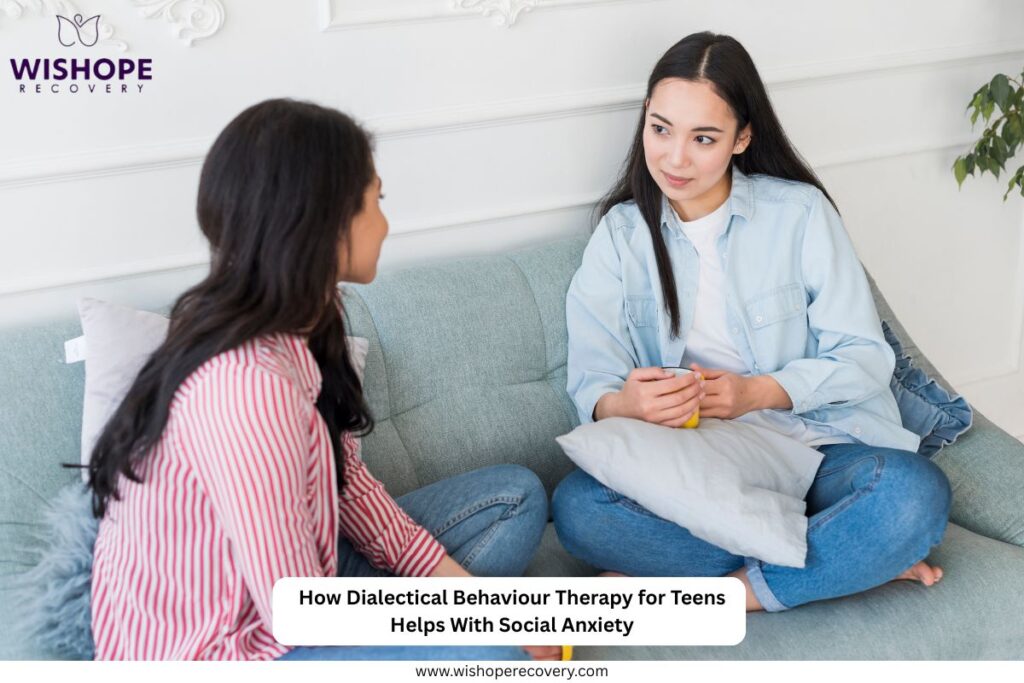Social anxiety impacts millions of teenagers around the world, and prevents them from making friends and participating in classroom activities and conversations as well as in day-to-day social interactions. For adolescents who experience intense social fears, Dialectical Behavior Therapy for Teens provides a holistic, evidence-based treatment to help them cope with these difficult feelings while developing important life skills.
Understanding Social Anxiety in Teenagers
Social anxiety disorder is more than usual teenage shyness or apprehension. It is excessive fear of social situations, fear of being judged or embarrassed, and associated bodily symptoms such as a rapid heart, sweating, and trembling. Social anxiety in teens can have a major impact on school performance, relationships with peers, and quality of life in those formative years.
Teenagers’ brains are still maturing, especially those involved in emotion management and social understanding. This naturally makes teenagers more sensitive to feedback from others and peer acceptance. Once social anxiety sets in, it can perpetuate a cycle where avoidance behaviors strengthen fears so that social interactions become ever more menacing.
What is Dialectical Behaviour Therapy?
Dialectical Behavior Therapy for Adolescents is an adapted form of DBT created by Dr. Marsha Linehan. It incorporates cognitive-behavioral methods with mindfulness training and tolerance of distress skills. “Dialectical” describes balancing acceptance of present situations and striving for improved outcomes.
DBT targets four skill modules central to its practice: mindfulness, distress tolerance, emotion regulation, and interpersonal effectiveness. These are especially useful for adolescents with social anxiety because they address the emotional intensity of anxiety as well as the concrete issues of navigating social relationships.
How DBT Specifically Addresses Social Anxiety
Mindfulness Skills for Social Situations
Mindfulness is the central pillar of DBT and is used to promote awareness of thoughts, emotions, and body sensations among teens without judging them. These skills can assist socially anxious teens in paying attention to anxiety without being overwhelmed by it. They learn to observe anxious ideas such as “Everyone is looking at me” or “I am going to embarrass myself” without necessarily believing these ideas.
By practicing mindfulness, adolescents are able to remain present in social interactions rather than getting entangled in worried anticipation of things to come or replaying past social experiences. Such an awareness in the moment provides space between the adolescent and worry so that they respond more reflectively and less habitually to avoid social situations.
Distress Tolerance for Managing Anxiety Intensity
Social anxiety is usually accompanied by overwhelming feelings of emotional distress. The skills of distress tolerance in Dialectical Behavior Therapy for Teens help young people learn to get through crisis seconds without escalating the situation with self-destructive behaviors such as total avoidance of other people or drug use.
Strategies such as the TIPP skill (Temperature, Intense exercise, Paced breathing, Paired muscle relaxation) assist adolescents in quickly alleviating the physical manifestations of anxiety. The ACCEPTS skill offers healthy distraction techniques when anxiety is too intense. These skills provide adolescents with confidence that they can deal with challenging emotions without completely staying away from social interactions.
Emotion Regulation for Anxiety Management
Emotion regulation skills help teens understand the function of their emotions and develop healthy ways to manage them. For socially anxious teens, this includes learning to identify triggers, understand the purpose of anxiety, and develop strategies to change or cope with anxious emotions.
The PLEASE skill encourages teens to take care of their physical health through proper sleep, nutrition, and exercise, which can significantly impact anxiety levels. The opposite action skill teaches teens to act opposite to their anxiety urges – for example, approaching social situations instead of avoiding them when the anxiety is not warranted.

Interpersonal Effectiveness for Social Skills
Perhaps most directly relevant to social anxiety, interpersonal effectiveness skills teach teens how to navigate relationships and social interactions successfully. The DEAR MAN skill helps teens communicate their needs clearly and assertively, while the GIVE skill focuses on maintaining positive relationships.
These skills are particularly valuable because social anxiety often stems from uncertainty about how to behave in social situations. By learning specific techniques for communication, conflict resolution, and relationship building, teens gain confidence in their ability to handle social interactions effectively.
The Structure of DBT for Teens
A comprehensive dbt therapy program typically includes individual therapy sessions, group skills training, phone coaching, and therapist consultation teams. For teens, the group component is especially valuable as it provides a safe environment to practice social skills with peers who understand similar struggles.
Group sessions for mental health allow teens to learn from each other’s experiences, practice new skills in a supportive setting, and gradually build confidence in social interactions. The structured nature of DBT groups helps reduce the unpredictability that often triggers social anxiety.
Finding the Right Support
When searching for dialectical behavior therapy near me, it’s important to find therapists specifically trained in working with adolescents. DBT for teens requires specialized knowledge about adolescent development and the unique challenges teenagers face.
Many families find success with programs that offer comprehensive dialectical behavior therapy for adolescents, combining individual and group therapy components. For families in Wisconsin, DBT therapy Milwaukee options may include specialized teen programs at mental health centers and private practices.
The Long-Term Benefits
DBT therapy for teenagers provides tools that extend far beyond managing social anxiety. Teens learn emotional regulation skills that help them navigate the many challenges of adolescence and young adulthood. The interpersonal effectiveness skills become invaluable for building healthy relationships, succeeding in academic and work environments, and maintaining emotional wellbeing throughout life.
Research shows that teens who complete DBT programs often experience significant improvements in anxiety symptoms, self-esteem, and overall social functioning. The skills learned in therapy become internalized tools that teens can use independently as they mature.
Conclusion
Social anxiety doesn’t have to limit a teenager’s potential or prevent them from forming meaningful connections. Through Dialectical Behavior Therapy for Teens, adolescents can learn practical skills to manage their anxiety while building the confidence needed to engage fully in social situations. The combination of mindfulness, distress tolerance, emotion regulation, and interpersonal effectiveness creates a comprehensive toolkit for navigating the complex social world of adolescence.
For families considering this therapeutic approach, remember that seeking help is a sign of strength, not weakness. With the right support and evidence-based treatment, teens can overcome social anxiety and develop the skills needed for a fulfilling, connected life.

